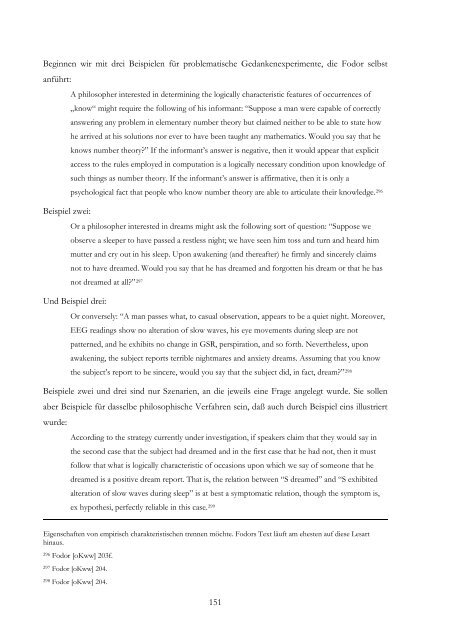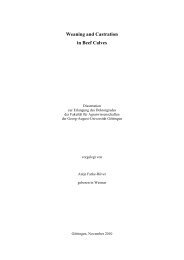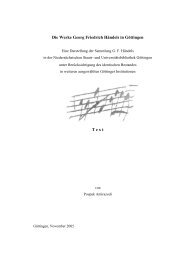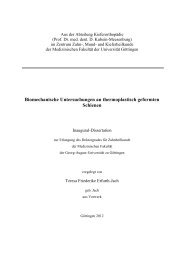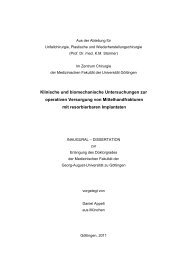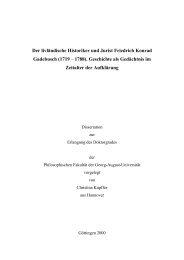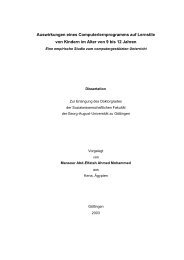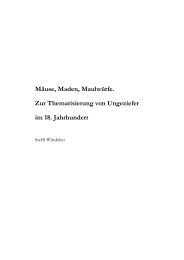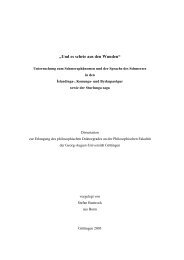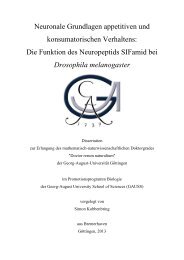Gedankenexperimente Eine Familie philosophischer Verfahren
Gedankenexperimente Eine Familie philosophischer Verfahren
Gedankenexperimente Eine Familie philosophischer Verfahren
Erfolgreiche ePaper selbst erstellen
Machen Sie aus Ihren PDF Publikationen ein blätterbares Flipbook mit unserer einzigartigen Google optimierten e-Paper Software.
Beginnen wir mit drei Beispielen für problematische <strong>Gedankenexperimente</strong>, die Fodor selbst<br />
anführt:<br />
Beispiel zwei:<br />
A philosopher interested in determining the logically characteristic features of occurrences of<br />
„know“ might require the following of his informant: “Suppose a man were capable of correctly<br />
answering any problem in elementary number theory but claimed neither to be able to state how<br />
he arrived at his solutions nor ever to have been taught any mathematics. Would you say that he<br />
knows number theory?” If the informant’s answer is negative, then it would appear that explicit<br />
access to the rules employed in computation is a logically necessary condition upon knowledge of<br />
such things as number theory. If the informant’s answer is affirmative, then it is only a<br />
psychological fact that people who know number theory are able to articulate their knowledge. 296<br />
Or a philosopher interested in dreams might ask the following sort of question: “Suppose we<br />
observe a sleeper to have passed a restless night; we have seen him toss and turn and heard him<br />
mutter and cry out in his sleep. Upon awakening (and thereafter) he firmly and sincerely claims<br />
not to have dreamed. Would you say that he has dreamed and forgotten his dream or that he has<br />
not dreamed at all?” 297<br />
Und Beispiel drei:<br />
Or conversely: “A man passes what, to casual observation, appears to be a quiet night. Moreover,<br />
EEG readings show no alteration of slow waves, his eye movements during sleep are not<br />
patterned, and he exhibits no change in GSR, perspiration, and so forth. Nevertheless, upon<br />
awakening, the subject reports terrible nightmares and anxiety dreams. Assuming that you know<br />
the subject’s report to be sincere, would you say that the subject did, in fact, dream?” 298<br />
Beispiele zwei und drei sind nur Szenarien, an die jeweils eine Frage angelegt wurde. Sie sollen<br />
aber Beispiele für dasselbe philosophische <strong>Verfahren</strong> sein, daß auch durch Beispiel eins illustriert<br />
wurde:<br />
According to the strategy currently under investigation, if speakers claim that they would say in<br />
the second case that the subject had dreamed and in the first case that he had not, then it must<br />
follow that what is logically characteristic of occasions upon which we say of someone that he<br />
dreamed is a positive dream report. That is, the relation between “S dreamed” and “S exhibited<br />
alteration of slow waves during sleep” is at best a symptomatic relation, though the symptom is,<br />
ex hypothesi, perfectly reliable in this case. 299<br />
Eigenschaften von empirisch charakteristischen trennen möchte. Fodors Text läuft am ehesten auf diese Lesart<br />
hinaus.<br />
296 Fodor [oKww] 203f.<br />
297 Fodor [oKww] 204.<br />
298 Fodor [oKww] 204.<br />
151


